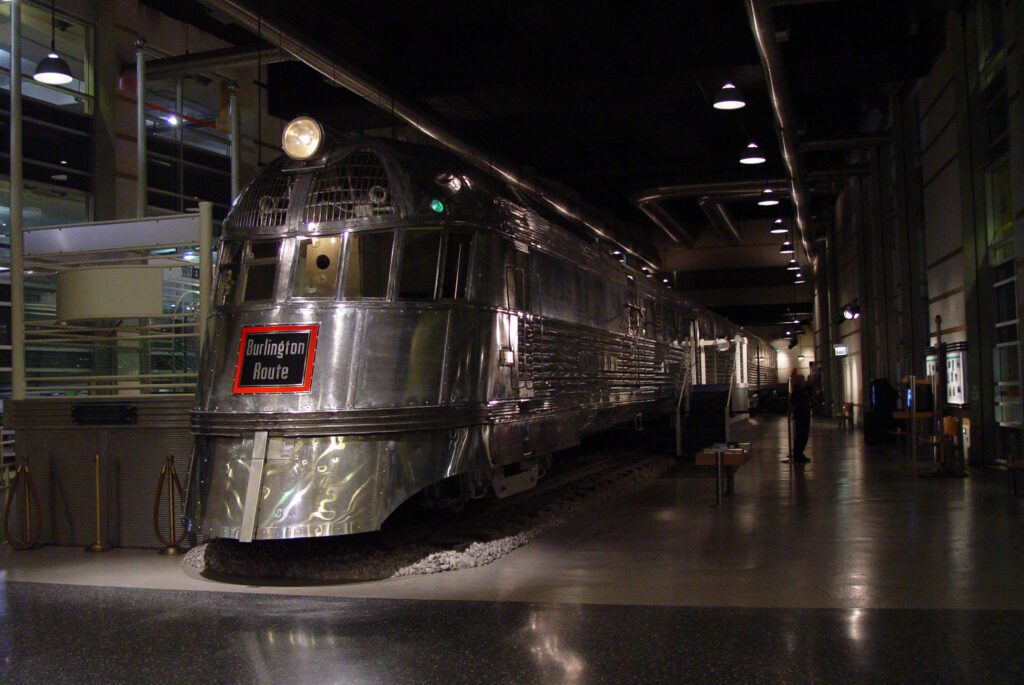I scheduled a trip to the Museum to see the U-505 on a Monday – after Labor Day – so that the crowds would be a bit smaller. The trip downtown, however, was agonizingly slow. It was raining that particular morning (one of the few storms that we had experienced all season long) and it took over two hours to make the 45-mile trip.
(This page may contain affiliate links. See our disclosure about affiliate links here.)
Arriving at the Museum, it was easy to see the spot where the sub was hidden underground on the north side of the building, for the grassy area was verdant and nothing else was on the site above-ground. But first…
Note: If you’re heading to Chicago to see some sites, it might be worthwhile to check out CityPass. You can save up to 48% off regular rates on the most popular attractions – including the Museum of Science and Industry , the Adler Planetarium and the Field Museum!

The Zephyr… and Then the U-505
Parking was easy , and only $12 “back then” (now $15 – $29 per day) – and we entered from the ground floor. This is where the restored Train known as the Zephyr was on display. (If you are interested, there is a dinner train in Spooner, WI , where a restored Zephyr is available to ride!) We secured our tickets and headed up the stairs to the main floor.
The airplanes were still attached and hanging from the high ceilings. The ever-popular coal mine exhibit was still there. There were also several other, memorable exhibits that still graced the halls. Other exhibits beckoned, but my desire was to go straight to the sub.
Our journey to the sub’s underground resting place was loaded with information for visitors to read and listen to, as well as watch. Several hologram presentations reenacted a few of the more memorable moments in the sub’s capture. Famous Chicago newsman Bill Curtis’s voice behind video clips detailed the history of how submarine warfare and our relentless pursuit of German submarine “wolf packs” impacted the outcome of World War II in the Atlantic.
T5 Acoustic Torpedoes
Finally arriving at the sub, herself, was very cool since she had been given an extensive facelift after many years of degradation due to infamous Chicago winters, and she looked almost new. Paint chips had been computer-analyzed in order to match the original paint job.
The conning tower had to be removed in order to keep from requiring another 30-40 feet of depth for the sub to fit in its new resting place. The conning tower and periscope were displayed off to one side of the boat.
A chill went through me as I gazed upon the four bow torpedo tubes and one of the infamous and secret T5 acoustic torpedoes displayed hanging in front of the sub. I tried to imagine the horror felt by American seamen observing – too late – the telltale trail of bubbles just before the torpedo made its fateful impact.
The Fateful Click…
Heidi reminded me that certainly it was no less horrifying for the German sailors who would hear the fateful “click” just prior to a depth charge detonating at a depth of over 200 feet and wonder whether or not they would soon find themselves entombed forever in the icy cold at the bottom of the ocean.
I also tried to imagine the thoughts of the deep wreck divers as they fought deepening narcosis. This from nitrogen inhaled at great depth and pressure, as they tried to enter a silt-filled mass of twisted pipes, wires and other dangers that lurked on a sunken German submarine lying on her side, as they attempted to determine the identity of the sub at the bottom of the ocean off the coast of New Jersey. (Recall the book Shadow Divers, from my article: Museum of Science and Industry.)
Next Up: Read about the ultimate capture of the U-505 and the capture of the German Enigma Machine.